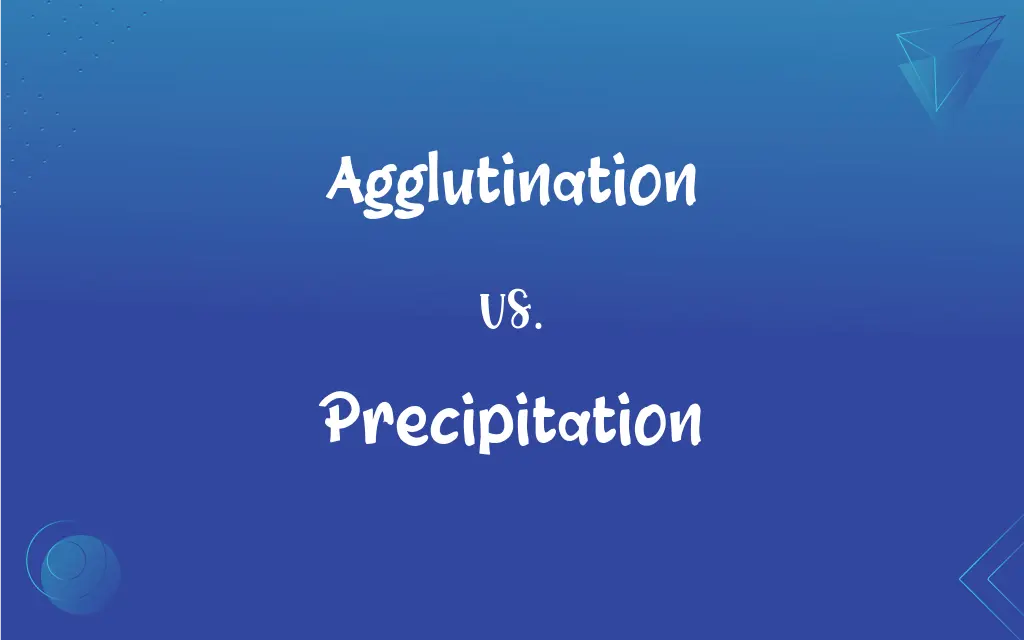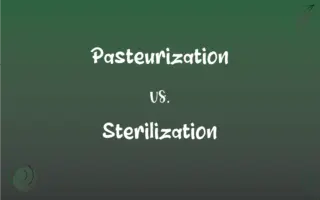Agglutination vs. Precipitation: What's the Difference?
Edited by Aimie Carlson || By Harlon Moss || Updated on October 27, 2023
Agglutination is the clumping of particles, while precipitation refers to the separation of a substance from a solution.

Key Differences
Agglutination and precipitation are both terms used in biology and chemistry, referring to different processes. Agglutination often pertains to the clumping together of particles, typically when antigens bind to their corresponding antibodies in the blood. This process is important in various diagnostic tests, like blood typing. On the other hand, precipitation is about a substance separating out from a solution as a result of a chemical reaction or change in conditions.
Within immunology, agglutination plays a significant role. For example, red blood cells can agglutinate if one receives the wrong type of blood during a transfusion. This is because the antibodies in the recipient's blood will recognize the donated blood as foreign and cause clumping. Precipitation, in a related context, happens when soluble antigens react with their antibodies, forming an insoluble complex that settles out of the solution.
While agglutination is more specific to the clumping phenomenon, especially in biological contexts, precipitation has a broader application across chemistry. Precipitation reactions are commonly seen when two soluble salts in solution combine to form an insoluble salt that settles out of the solution. Agglutination, by contrast, doesn't necessarily result in the formation of an insoluble substance.
In summary, while both agglutination and precipitation involve reactions that lead to the accumulation or settling of particles, their causes and contexts can differ. Agglutination is largely about particle clumping, especially in a biological context, whereas precipitation pertains more to the formation and settling of insoluble substances in solutions.
Comparison Chart
Definition
Clumping of particles.
Separation of a substance from a solution.
ADVERTISEMENT
Typical Context
Biological, especially with antigens and antibodies.
Chemistry, forming insoluble compounds.
Result
Clumps or aggregates.
Insoluble substance settling out of a solution.
Application
Diagnostic tests, blood typing.
Formation of insoluble salts in reactions.
Solubility
Doesn't necessarily involve formation of an insoluble substance.
Involves formation of an insoluble substance.
Agglutination and Precipitation Definitions
Agglutination
The process of particles clumping together.
Blood typing relies on the agglutination of red blood cells.
ADVERTISEMENT
Precipitation
A sudden occurrence or appearance.
His hasty actions were the precipitation of many problems.
Agglutination
Formation of aggregates or clusters.
Under the microscope, the agglutination of cells was evident.
Precipitation
Formation of an insoluble compound in a solution.
Adding silver nitrate caused the precipitation of silver chloride.
Agglutination
Joining together of elements.
Linguistically, agglutination can refer to words or morphemes binding together.
Precipitation
The settling or deposition of particles.
Precipitation was evident at the bottom of the flask.
Agglutination
A reaction where antigens bind to antibodies.
Agglutination tests help determine the presence of specific antibodies in the blood.
Precipitation
Any form of water, like rain or snow, that falls from the atmosphere.
The weather forecast predicts heavy precipitation tomorrow.
Agglutination
A reaction indicating compatibility or incompatibility in transfusion medicine.
A lack of agglutination indicated the blood was a match for the patient.
Precipitation
The process where a substance separates out from a solution.
The chemical reaction led to the precipitation of a white solid.
Agglutination
The act or process of agglutinating; adhesion of distinct parts.
Precipitation
Any form of water, such as rain, snow, sleet, or hail, that falls to the earth's surface.
FAQs
What does agglutination refer to?
It refers to the clumping together of particles, often in a biological context.
Is agglutination specific to biology?
While often used in a biological context, especially with antigens and antibodies, agglutination can refer to clumping in other contexts.
Where do you commonly observe precipitation reactions?
In chemistry, when two soluble salts form an insoluble one.
Does agglutination involve insoluble substances?
Not necessarily, it's more about particle clumping.
Is precipitation always about chemistry?
While common in chemistry, precipitation can also mean any atmospheric water, like rain or snow.
What happens in a precipitation reaction?
An insoluble substance forms and settles out of a solution.
Does agglutination involve a change in state?
Not necessarily, it's primarily about particle clumping.
Why is agglutination important in blood transfusions?
It can indicate compatibility or incompatibility of blood types.
Is agglutination only related to blood?
No, it's about particle clumping, but is often referenced in blood contexts.
How does temperature affect precipitation?
Temperature changes can promote or prevent the precipitation of substances.
Can agglutination occur in non-liquid mediums?
While commonly in liquids, the concept can extend to other contexts, like linguistics.
What's an example of agglutination in language?
In linguistics, it refers to the binding of words or morphemes.
What causes precipitation in a solution?
Chemical reactions or changes in conditions can cause substances to precipitate.
Is precipitation always visible?
Typically, it results in visible settling of a substance, but the degree can vary.
Does precipitation indicate a permanent change?
Often, but the precipitate can sometimes be redissolved under certain conditions.
Are agglutination and precipitation reversible processes?
Agglutination can sometimes be reversed, and some precipitates can be redissolved, depending on conditions.
How does precipitation differ?
Precipitation involves a substance separating from a solution, often due to a chemical reaction.
Can agglutination be harmful?
Yes, especially if one receives the wrong blood type, leading to blood clumping.
Can you observe precipitation in daily life?
Yes, rain and snow are forms of precipitation.
How is agglutination used diagnostically?
It can determine the presence of specific antibodies in blood.
About Author
Written by
Harlon MossHarlon is a seasoned quality moderator and accomplished content writer for Difference Wiki. An alumnus of the prestigious University of California, he earned his degree in Computer Science. Leveraging his academic background, Harlon brings a meticulous and informed perspective to his work, ensuring content accuracy and excellence.
Edited by
Aimie CarlsonAimie Carlson, holding a master's degree in English literature, is a fervent English language enthusiast. She lends her writing talents to Difference Wiki, a prominent website that specializes in comparisons, offering readers insightful analyses that both captivate and inform.































































